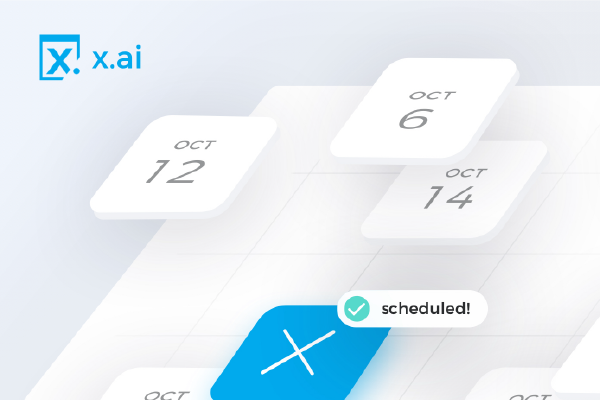A quick look at the top options for those deciding on which tool to use to automate scheduling in your law practice.
JULY 2021 UPDATE: x.ai Scheduling Tool Will Be Sunset — Following Bizzabo’s acquisition of x.ai at the end of May, it has announced the x.ai standalone scheduling service will end on October 31, 2021.
Most of us have spent more time scheduling meetings than we’d like — it’s ripe for automation. Scheduling was included among our top 3 areas to start automating in this post from 2017. As noted there, many of us have been using a tool for scheduling as a group for some time (usually Doodle) and are ready to expand. Automating scheduling for clients can save even more time, including your clients’, which can improve their experience (and their likelihood of becoming a referral source).
To assess options, you always need to start with your individual needs and preferences. What features you need depends on exactly how you want to go about booking clients as well as how it plugs into your other operations. For scheduling tools, many considerations are common to us all — perhaps why options like Doodle are still often the top option for scheduling as a group, formally or informally. And for when we want to allow individuals to choose among our (or our team’s) availability, there have been a couple frontrunners — Calendly and Microsoft Bookings.
Doodle recently added a beta feature for booking guests — “bookable calendar” — similar to Calendly or Bookings. And as Doodle expands its flexibility, time will tell how much more robust its features become to compete with other products.
Meanwhile, a fourth option, x.ai has expanded its features since it first launched in 2014 as a pricey “automated scheduling assistant” that would correspond on by email on your behalf to find mutually available time. Although I thought it was innovative back then, as someone booking time, I would always prefer to look at a calendar or listing of available options and click to book, rather than communicate with a bot. Fortunately, its developers aren’t trying to compete in the scheduling space with a one-trick pony, and x.ai has started to offer just about the best flexibility around.
With four ways to schedule, x.ai allows you to set different availability for various meeting formats, and offers a unique feature for automated follow-ups to guests who haven’t scheduled yet. Setting up an automated reminder to schedule isn’t (yet) a feature offered by Calendly, Bookings, or Doodle, and offers an obvious advantage when you’d otherwise need not only to pay for a second product, but to set it up (with the integration). X.ai’s recent developments were featured in a recent Law Practice Magazine article by Heidi Alexander, our former deputy director who now directs the Massachusetts SJC Standing Committee on Lawyer Well-Being.
With some concern over various bugs she’s encountered using x.ai personally, despite solid customer support, Heidi hesitates whether it’s ready to implement across an organization. Still, x.ai might worth using on a limited trial basis so you know (if and) when the time is right to take advantage of its flexibility. The four ways to schedule (as covered in Heidi’s article, X.ai: Your Artificial Assistant) follow:
- Automated Email Assistant — You copy the email address to loop in x.ai, it reads your calendar, and emails with your guest to narrow down a time.
- Guest Availability First — You provide a link for guests to provide their availability, and x.ai compares it to yours to find a time, similar to Doodle.
- Guests Book from Your Calendar — You provide a link to your calendar page (you can have different links with different settings for different purposes, e.g. quick coffee with colleagues v. client consultations), x.ai keeps your current availability synced, and your guest simply selects a time, different customized similar to Calendly, Bookings, and Doodle’s ‘bookable calendar’ in beta.
- Guests Select from Specified Availability — You can limit your guest’s options, e.g. to a specific timeframe, by copying it from your x.ai calendar and pasting it in your email; x.ai creates an image with your synced availability that your guest can click on to choose their time.
A quick wrap up on other key features, many of which are shared by Calendly and Doodle — you can collect payments, connect multiple calendars, schedule with team members round robin (or as a group), book conference rooms, and more. And importantly, its price has come down, as they often do, currently at $8/month for individuals and $12/month for teams.
Team admin access on Calendly is (currently) stronger than x.ai. Team admins only have access to “combined” meeting types, i.e. those that provide shared availability for multiple teammates. You could work around it by making a “combined” meeting type and only adding one team member, but you still can’t edit more global settings for each team member, which Calendly does allow and can be essential to operations.
A couple other features keeping Calendly competitive after lagging on until last year: one-time scheduling links as well as the ability copy & paste selected times. The need to limit a guest’s ability to book time is comon, and until last year, the only way to do it on Calendly was through a Chrome extension, which Calendly finally built in for all users. Calendly (currently) allows better flexibility on the copy & paste method — with the options to include up to 7 days to x.ai’s 3, and to narrow down slots within each day
Related:
Essential Settings for Online Scheduling Tools (NCBA Center for Practice Management, June 2021)
Defensive Calendaring (ABA Law Practice Magazine, September/October 2021)
Free & Confidential Consultations:
Lawyers, law students, and judges in Massachusetts can discuss concerns with a law practice advisor, licensed therapist, or both. Find more on scheduling here.
. . .
An earlier post on our blog, “Time in a Bottleneck: Online Scheduling Tools Make Meetings Happen,” now redirects here.




